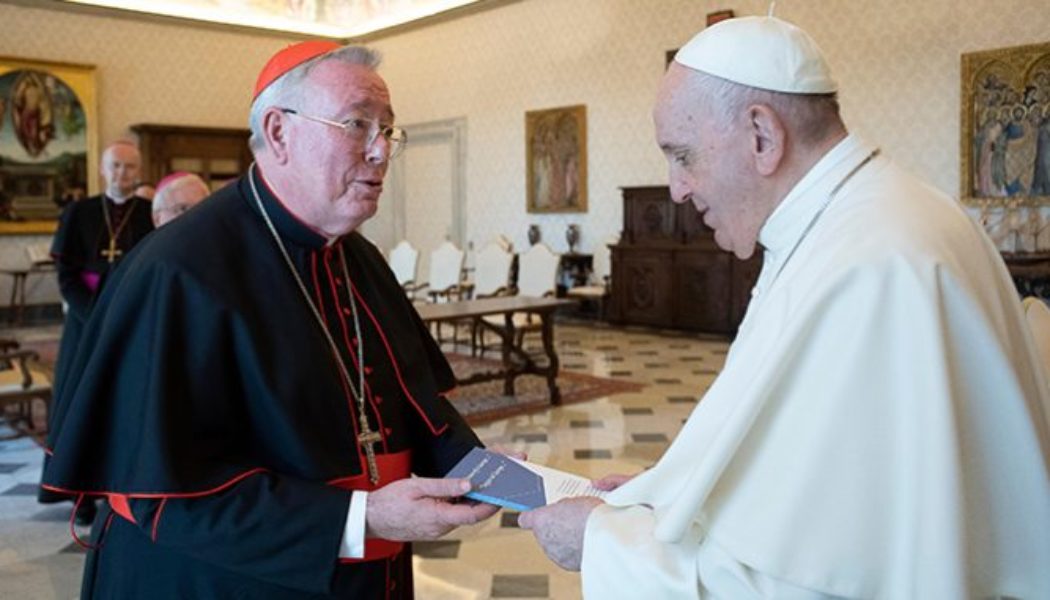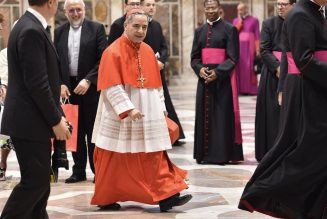
Raised in a Fundamentalist Protestant home and Bible chapel, I held to more than a few incorrect (and even wildly false) notions about the Catholic Church. Most of these involved Mary and the papacy. Catholics worship Mary! Catholics believe Mary is the fourth Person of the Trinity! Catholics worship the pope!
We believed, based in part on the magisterial writings of Presbyterian theologian Lorraine Boettner (1901-1990), the equally magisterial comics of Jack Chick (1924-2016), and the rightly interpreted King James translation of the Bible, that the Catholic Church was a massive and mysterious pseudo-Christian organization built on the false teachings of various popes. And popes, we thought, could make up and change Catholic beliefs on an unholy whim. If Pope A said, “Worship Mary,” then Catholic worshiped Mary. And if Pope B said something different, Catholics reversed course with dutiful and unthinking obedience.
Some thirty years ago, in the course of studying actual Church teaching, as well as a fair amount of history, I discovered just how woefully wrong, even bizarre, were those perceptions. The writings of Church fathers and doctors, and the documents of the many councils were instructive. Chapter II from Vatican II’s Dei Verbum, for example, put several pieces in their correct places:
But the task of authentically interpreting the word of God, whether written or handed on, has been entrusted exclusively to the living teaching office of the Church, whose authority is exercised in the name of Jesus Christ. This teaching office is not above the word of God, but serves it, teaching only what has been handed on, listening to it devoutly, guarding it scrupulously and explaining it faithfully in accord with a divine commission and with the help of the Holy Spirit, it draws from this one deposit of faith everything which it presents for belief as divinely revealed. (par 10; cf Lumen Gentium, Chapter III)
How curious, then, to find that one of the more “progressive” prelates in the Church, Cardinal Jean-Claude Hollerich of Luxembourg, apparently subscribes to some form of the Fundamentalist understanding of the papacy. In a recent and lengthy interview with the Croatian weekly Glas Koncila, Hollerich was asked about the possibility of women being ordained priests. He answered that Pope John II’s 1994 Apostolic Letter Ordinatio Sacerdotalis was “surely is a true teaching for its time, and we cannot just push it aside. But I think that there might be some space to expand the teaching – to see which of the arguments of Pope John Paul II could be developed. But for the moment, if Pope Francis tells me it is not an option, it is not an option.” And then:
If it is so, how can we ever certainly know if a Pope is right in his teaching?
There is no way you can strictly go against the Pope’s teaching, yet sometimes there is a development in thought which can lead to different conclusions. But if I were the one to jump to those conclusions, it would be preposterous. It is the whole Church together with Peter that must acknowledge there was a development.
The use of “development” here is, most likely, an appeal to Newman’s famous writings on the topic, which state—put simply—that authentic development of doctrine is a cohesive maturation, not a change or rupture. Keep in mind that John Paul II, in his rather terse and quite clear Letter, stated that “the teaching that priestly ordination is to be reserved to men alone has been preserved by the constant and universal Tradition of the Church and firmly taught by the Magisterium,” but that because some were still making hay and saying otherwise, he would settle the matter:
Wherefore, in order that all doubt may be removed regarding a matter of great importance, a matter which pertains to the Church’s divine constitution itself, in virtue of my ministry of confirming the brethren (cf. Lk 22:32) I declare that the Church has no authority whatsoever to confer priestly ordination on women and that this judgment is to be definitively held by all the Church’s faithful.
But, according to Hollerich, that was then, this is now, and his finger is to the wind, however politely. Yet it’s much more serious than just saying, “I disagree with that Pope on this matter of faith and morals,” because, as John Paul II notes in referring back to a 1975 text by Paul VI, this teaching about the ordination of woman is rooted in Sacred Scripture and Tradition—that is, in divine revelation. And popes, in the end, are servants of the divinely revealed Word of God.
Does Hollerich therefore believe that divine revelation might be mistaken? Or, does he think that the Magisterium has gotten it wrong on certain matters of faith and morals? Further, does he really think that if the “whole Church” and the Pope suddenly decide that the Church was wrong for 2000 years on X, Y, or Z (and that is a substantial, delusional “if”), that the Church can really continue to be what she has always said she is—the Body of Christ, “the household of God,” and “the pillar and foundation of truth” (1 Tim 3:15)?
Of course, Hollerich is clever enough to avoid these questions directly. Yet he is audacious enough to put forth sorry sophistries when it comes to what is, by all appearances, his favorite project: undermining and completely remaking the Church’s teachings on sexuality. Thus, the Church’s perennial doctrine on homosexuality is outdated, he says, because “the term homosexuality did not even exist [in the early Church]. Homosexuality is a new word; even in the time of Saint Paul people had no idea that there might be men and women attracted to the same sex.” That is, put simply, false, as Anglican biblical scholar N. T. Wright pointed out nearly two decades ago.
However, that is just one problem. “But how can you condemn people who cannot love except the same sex?” he says. “For some of them it is possible to be chaste, but calling others to chastity seems like speaking Egyptian to them.” Who cannot love except the same sex? Love, it seems, is both a sacred and fatalistic emotion that simply cannot be denied. Is Hollerich a Catholic bishop or a transgressive romance novelist? Does he not believe that Christ’s grace is sufficient? Furthermore, if chastity is impossible for some, then could it be that refraining from racism, pederasty, polygamy, dog fighting, and intolerant neo-Pelagianism is just as impossible for others?
But the Cardinal, who has never hidden his love for the Gospel of Trendy Sociology, insists, “A homosexual person will always love people of the same sex.” To quote a famous musical squad from New Jersey: “You give love a bad name.”
Further, Hollerich says, “homosexual people must feel welcome in our house. Otherwise, they will go away.” It is, of course, always about feelings. It brings to mind the sentence, “When the young man heard this he went away sorrowful; for he had great possessions” (Mt 19:22). Let’s cut to the chase: emotions and passions are the great possessions of our time. Many will forsake the King and the Kingdom because of their passionate desires and obstinate proclivities. Sadly, Hollerich seems convinced the Church will eventually catch up to his 1960’s vision of sexuality and love. Honest to God, he seems intent on being the John A. T. Robinson of our time, treating sexuality with a sort of weaponized naivety (or, perhaps, calculated ideology).
Having misrepresented doctrine, theology, and history, Hollerich turns to Scripture:
When Jesus meets somebody like Zacchaeus, he does not say: ‘You have to change your life, my boy, and then, perhaps, if you do penance, I might consider visiting you.’ No; his look on such a person puts them at ease and makes them feel accepted. Then Jesus goes to their house, and only then do they change. I do not exclude change, but it comes after meeting Jesus.
Note, again, the emphasis on “feeling”. This is polemical silliness, intended to smear orthodox Catholics as haters who insist that Jesus will have nothing to do with sinners until they’ve cleaned up properly before meeting Him. Zaccheus, in fact, is presented by St. Luke in purposeful contrast to the rich, young ruler. The latter had kept the commandments, but could not give himself over completely to Christ, withholding that one thing he yet desired to keep for himself.
Zaccheus, viewed by all as a sinner, receives Christ with joy and offers all that he has, with complete abandonment. The juxtaposition is both moral and soteriological. Morality is rooted in authentic love—not feelings, but willed gift of self; salvation comes through death to self and life to God. All of us are called to abandon something; Cardinal Hollerich would like to make exceptions for certain people. Why? Is it because he is captive to the zeitgeist?
Finally, let’s note that Hollerich, in addressing these various matters, directly undermines St. Pope John Paul II. This is obvious with the matter of women’s ordination. His remarks on sexuality go completely contrary to John Paul II’s theology of the body and, of course, the Catechism, which the late pontiff promulgated in 1994. And Hollerich’s remarks on feelings and love, as well about Zaccheus, throws shade on Veritatis Splendor as well as Dives in Misericordia and other texts. (The obsessive dislike of Veritatis Splendor by nearly everyone within Pope Francis’s inner circle is obvious and important, as I’ve indicated before.)
In the end, the deepest problem is that Hollerich and Co. have such a distorted understanding of divine revelation, the Papacy and Magisterium, and the development of doctrine. As well as sexuality, moral doctrine, and conscience. In obvious ways, it’s the same old progressive nonsense of the 1960s and onward; in other and less obvious ways, oddly enough, it is downright Fundamentalist.
If you value the news and views Catholic World Report provides, please consider donating to support our efforts. Your contribution will help us continue to make CWR available to all readers worldwide for free, without a subscription. Thank you for your generosity!
Click here for more information on donating to CWR. Click here to sign up for our newsletter.








